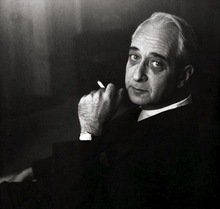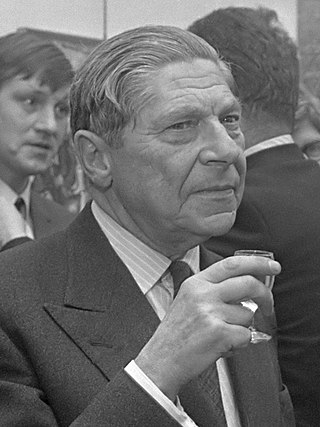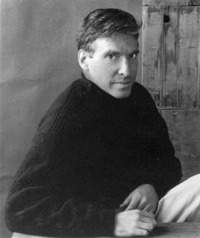
Animal Farm is a beast fable, in the form of a satirical allegorical novella, by George Orwell, first published in England on 17 August 1945. It tells the story of a group of anthropomorphic farm animals who rebel against their human farmer, hoping to create a society where the animals can be equal, free, and happy. Ultimately, the rebellion is betrayed and, under the dictatorship of a pig named Napoleon, the farm ends up in a state as bad as it was before.

Eric Arthur Blair was an English novelist, poet, essayist, journalist, and critic who wrote under the pen name of George Orwell. His work is characterised by lucid prose, social criticism, opposition to totalitarianism, and support of democratic socialism.

Saul Bellow was a Canadian–American writer. For his literary work, Bellow was awarded the Pulitzer Prize, the 1976 Nobel Prize in Literature, and the National Medal of Arts. He is the only writer to win the National Book Award for Fiction three times, and he received the National Book Foundation's lifetime Medal for Distinguished Contribution to American Letters in 1990.

Homage to Catalonia is George Orwell's personal account of his experiences and observations fighting in the Spanish Civil War for the POUM militia of the Republican army.

Lionel Mordecai Trilling was an American literary critic, short story writer, essayist, and teacher. He was one of the leading U.S. critics of the 20th century who analyzed the contemporary cultural, social, and political implications of literature. With his wife Diana Trilling, whom he married in 1929, he was a member of the New York Intellectuals and contributor to the Partisan Review.

Partisan Review (PR) was a left-wing small-circulation quarterly "little magazine" dealing with literature, politics, and cultural commentary published in New York City. The magazine was launched in 1934 by the Communist Party USA–affiliated John Reed Club of New York and was initially part of the Communist political orbit. Growing disaffection on the part of PR's primary editors began to make itself felt, and the magazine abruptly suspended publication in the fall of 1936. When the magazine reemerged late in 1937, it came with additional editors and new writers who advanced a political line deeply critical of Joseph Stalin's Soviet Union.

Darkness at Noon is a novel by Hungarian-born novelist Arthur Koestler, first published in 1940. His best known work, it is the tale of Rubashov, an Old Bolshevik who is arrested, imprisoned, and tried for treason against the government that he helped to create.

Dying Inside is a science fiction novel by American writer Robert Silverberg. It was nominated for the Nebula Award in 1972, and both the Hugo and Locus Awards in 1973.

The Gladiators (1939) is the first novel by the author Arthur Koestler; it portrays the effects of the Spartacus revolt in the Roman Republic. Published in 1939, it was later reprinted in other editions.
Harold Rosenberg was an American writer, educator, philosopher and art critic. He coined the term Action Painting in 1952 for what was later to be known as abstract expressionism. Rosenberg is best known for his art criticism. From 1962 until his death, he was the art critic of The New Yorker.

Dangling Man is a 1944 novel by Saul Bellow. It is his first published work.

Arthur Koestler was a Hungarian-born author and journalist. Koestler was born in Budapest and, apart from his early school years, was educated in Austria. In 1931, Koestler joined the Communist Party of Germany, but he resigned in 1938 after becoming disillusioned with Stalinism.

Winston Smith is a fictional character and the protagonist of George Orwell's dystopian 1949 novel Nineteen Eighty-Four. The character was employed by Orwell as an everyman in the setting of the novel, a "central eye ... [the reader] can readily identify with."
In 1949, shortly before he died, the English author George Orwell prepared a list of notable writers and other people he considered to be unsuitable as possible writers for the anti-communist propaganda activities of the Information Research Department, a secret propaganda organisation of the British state under the Foreign Office. A copy of the list was published in The Guardian in 2003 and the original was released by the Foreign Office soon after.

The bibliography of George Orwell includes journalism, essays, novels, and non-fiction books written by the British writer Eric Blair (1903–1950), either under his own name or, more usually, under his pen name George Orwell. Orwell was a prolific writer on topics related to contemporary English society and literary criticism, who has been declared "perhaps the 20th century's best chronicler of English culture." His non-fiction cultural and political criticism constitutes the majority of his work, but Orwell also wrote in several genres of fictional literature.

Nineteen Eighty-Four is a dystopian novel and cautionary tale by English writer George Orwell. It was published on 8 June 1949 by Secker & Warburg as Orwell's ninth and final book completed in his lifetime. Thematically, it centres on the consequences of totalitarianism, mass surveillance, and repressive regimentation of people and behaviours within society. Orwell, a democratic socialist, modelled the authoritarian state in the novel on the Soviet Union in the era of Stalinism and Nazi Germany. More broadly, the novel examines the role of truth and facts within societies and the ways in which they can be manipulated.

Scum of the Earth is a memoir by Anglo-Hungarian writer Arthur Koestler in which he describes his life in France during 1939-1940, the chaos that prevailed in France just prior to the outbreak of the Second World War and France’s collapse, his tribulations, internment in a concentration camp, and eventual escape to England, via North Africa and Portugal. It was first published by Jonathan Cape in 1941.

Benjamin Taylor is an American writer whose work has appeared in a number of publications including The Atlantic, Harper's, Esquire, Bookforum, BOMB, the Los Angeles Times, Le Monde, The Georgia Review, Raritan Quarterly Review, Threepenny Review, Salmagundi, Provincetown Arts and The Reading Room. He is a founding member of the Graduate Writing Program faculty of The New School in New York City, and has also taught at Washington University in St. Louis, the Poetry Center of the 92nd Street Y, Bennington College and Columbia University. He has served as Secretary of the Board of Trustees of PEN American Center, has been a fellow of the MacDowell Colony and was awarded the Iphigene Ochs Sulzberger Residency at Yaddo. A Trustee of the Edward F. Albee Foundation, Inc., he is also a Fellow of the New York Institute for the Humanities at New York University and a Guggenheim Fellow for 2012 - 2013. Taylor's biography of Marcel Proust, Proust: The Search, was published in October 2015 by Yale University Press as part of its newly launched Yale Jewish Lives series.

Arguably: Essays is a 2011 book by Christopher Hitchens, comprising 107 essays on a variety of political and cultural topics. These essays were previously published in The Atlantic, City Journal, Foreign Affairs, The Guardian, Newsweek, New Statesman, The New York Times Book Review, Slate, Times Literary Supplement, The Wall Street Journal, The Weekly Standard, The Wilson Quarterly, and Vanity Fair. Arguably also includes introductions that Hitchens wrote for new editions of several classic texts, such as Animal Farm and Our Man in Havana. Critics' reviews of the collection were largely positive.

Inside Story is an autobiographical novel by the English author Martin Amis, published in 2020. It was Amis' final novel to be published before his death in 2023.

















